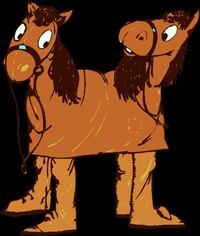by Joe Moore
 One of the most frequently asked questions Lynn Sholes and I get is “How is it possible for two people to write fiction together?” The answer is, it ain’t easy. At least it wasn’t at first. Collaboration on non-fiction is somewhat easier to understand. In general, with non-fiction, the “facts” usually already exist and the collaborators’ job is to organize them into a readable document that has a beginning, middle and end. A good outline and knowledge of the subject matter along with professional writing skills may be all the authors need.
One of the most frequently asked questions Lynn Sholes and I get is “How is it possible for two people to write fiction together?” The answer is, it ain’t easy. At least it wasn’t at first. Collaboration on non-fiction is somewhat easier to understand. In general, with non-fiction, the “facts” usually already exist and the collaborators’ job is to organize them into a readable document that has a beginning, middle and end. A good outline and knowledge of the subject matter along with professional writing skills may be all the authors need.
But with fiction, nothing exists. It’s all smoke and mirrors (a great title of a great thriller by my fellow KillZone blogger, John Ramsey Miller, by the way). Fiction is a product of an individual’s imagination. It might be inspired by actual facts or events, but only the individual has a specific vision of those events in their head. So how can two people have a similar enough vision to be able to write a novel?
I can’t speak for the handful of other writing teams out there, but Lynn and I have managed to complete 4 thrillers together because of a number of reasons. First, we love the same kind of books—the ones we read are like the ones we write. Second, we have an unquestioning respect for each other’s writing skills and a deep belief that whatever one of us writes, the other can improve. Third, we believe that there’s always a better way to write something. Fourth, we never let our egos get in the way of a good story. This comes from spending over 10 years in a weekly writers critique group. Fifth, we know each other’s strengths and weaknesses, and are willing to admit them. Sixth, we agree on the same message in each book. Seventh, we believe that we are on the same level of expertise. And last, we believe that the whole is greater than the sum of the parts.
Those points cover the mental portion. Now, how do we handle the mechanics of the job. We talk, and talk, and talk. At least once a day we conference call, brainstorming and telling and retelling each other the story. Our two favorite words are: What if? Whether it’s global plot points or an individual scene or character motivation, we keep telling each other the story until that little imaginary movie in our minds becomes as in sync as possible. Then one of us will declare they have a “handle” on the scene or character or chapter, and create the first draft.
We write very slowly because each chapter must go back and forth many times for revision. Years ago, when we first started, everyone could tell who wrote what as we tried to write our first book. It took three years of hard work before we melted our voices together. Now, because the process goes through so many revisions, even I can’t always remember what I wrote and what she wrote. I rely on my co-writer so much that I’ve come to wonder how individuals can possibly write a book on their own.
There are a number of advantages and disadvantages to collaborating. A disadvantage is that you split any money you make. So you’ll always make half of what you could as a single author. And like any relationship, there is always a chance of a falling out. And something could happen where an ego can become inflated and affect the process.
One of the pluses is that we never experience writer’s block. One of us will always have an idea on how to get out of a jam or move the story forward. And unlike our family, friends, trusted beta readers, and everyone else, a co-writer has an intimate, vested interest in the success of the story that no one else could have.
Lynn and I are approaching the mid-point of our fifth thriller together. I’ve found that creating the first draft of a chapter is just as exciting as getting a new chapter from her and seeing where the story has gone. I guess the whole thing boils down to trust. Trust in each other and in the goals we both want to achieve with the story and with our careers.
So, now that you know how we write together, do you think you could ever collaborate on a novel? Or is writing fiction too private an experience. Do you believe two heads are better than one or would you rather not have anyone sticking their nose in your work?


